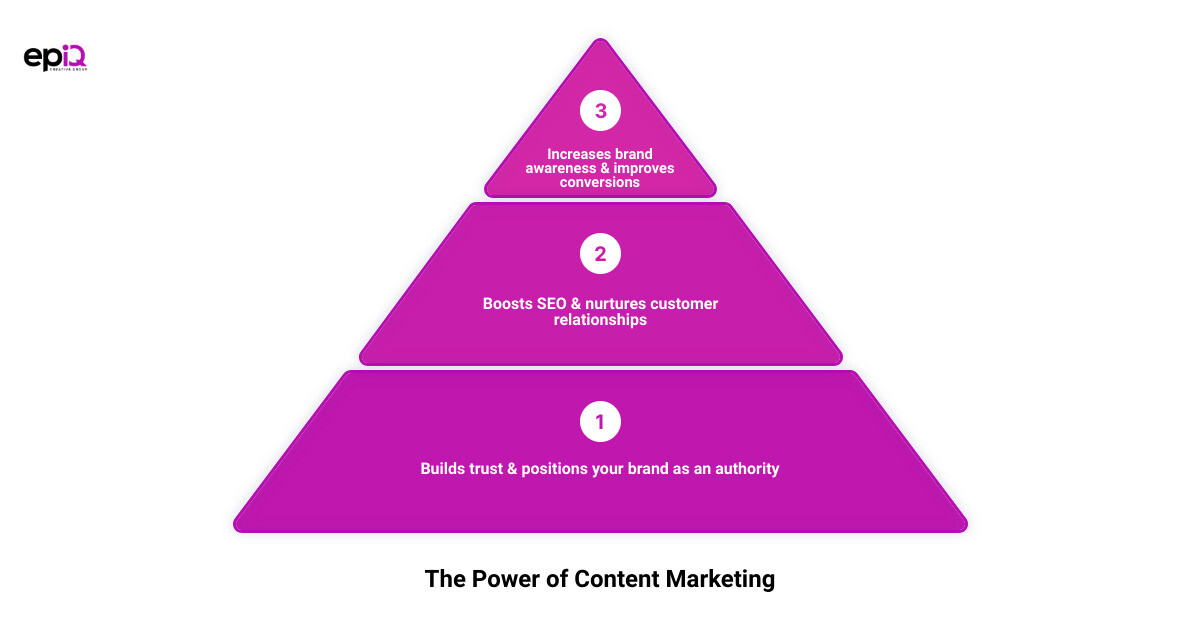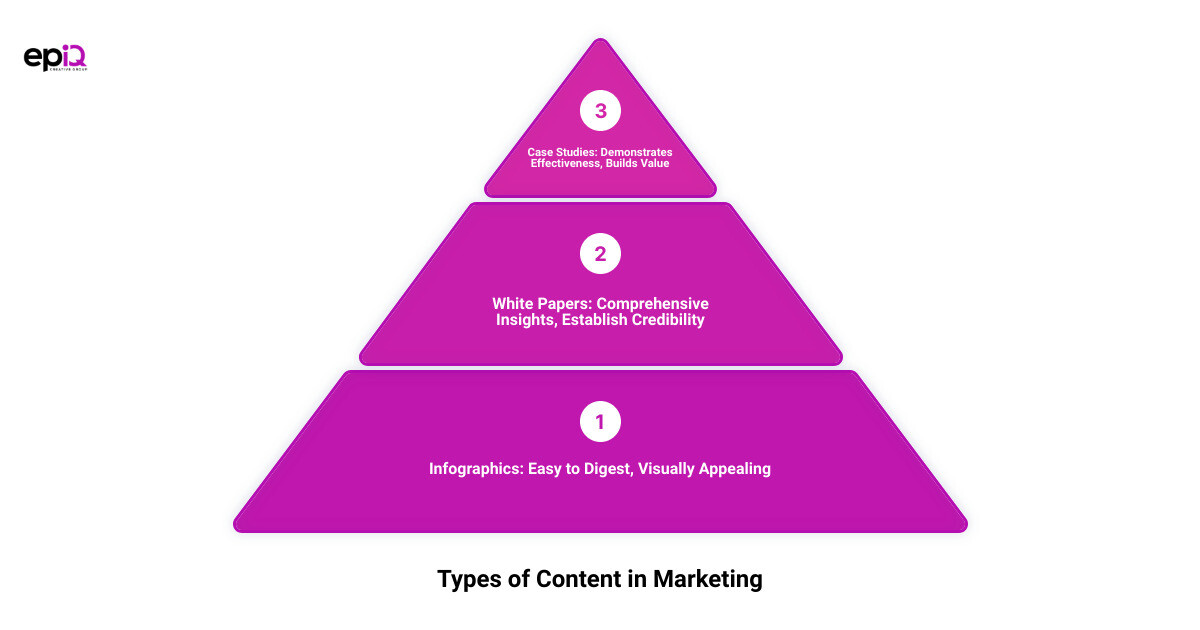History abounds with memorable and powerful stories. From the folk tales told around the fire to the highest-grossing films at the box office, storytelling has always been an intrinsic part of human culture. It shouldn’t surprise us, then, that storytelling alsoplays a significant role in the arena of content marketing. When it comes to creating compelling content that resonates with your audience, hooks their interest, and fosters emotional connections, the power of storytelling proves truly transformational.
Here at epIQ Creative Group, we specialize in harnessing that power, integrating it into our content marketing strategies to help businesses like yours capture the attention of their target audience, engaging them with authentic and memorable content. Content marketing isn’t just a matter of publishing blog posts or sharing updates on social media. It’s about strategically weaving a narrative that reflects your brand, resonates with your customers, and distinguishes you from the competition.
But, you might ask, what exactly is content marketing, and why is storytelling so crucial? To address these questions, we’ll dive into a comprehensive exploration of content marketing and the central role that storytelling plays in this context. From crafting a unique brand narrative and creating empathy with your audience, to effectively applying different types of content marketing and understanding its impact on your sales and customer engagement, our expert team has got all the bases covered.
By the end of this guide, you’ll have a clear understanding of why so many successful businesses are making storytelling a prominent part of their content marketing content strategy and how you can do the same to propel your brand to new heights.
Content Marketing at a Glance:
- A strategic approach to creating and distributing valuable, relevant content to attract a defined audience.
- Goal: Increase brand awareness, drive customer engagement, and improve conversions.
- Key tactic: Utilize storytelling to engage audiences and humanize your brand.
- Different formats: Blogs, social media posts, videos, infographics, webinars, case studies, e-books.
- Importance: Builds trust, positions your brand as an authority, boosts SEO, nurtures customer relationships.

Understanding Content Marketing: Definition and Importance
What is Content Marketing?
In the digital age, traditional marketing strategies are no longer the only game in town. Enter content marketing, a strategic approach that focuses on thoughtfully creating and distributing valuable, relevant, and consistent content to attract and retain a clearly defined audience — and, ultimately, to drive profitable customer action. It’s not about pitching your products or services, but about providing useful content to your prospects and customers to help them solve their problems.
At epIQ Creative Group, we view content marketing as a powerful tool that allows brands to deliver relevant and valuable information to their audience. The content could be consumed in various forms – video, written articles, or audio – depending on the audience’s preference.
Why is Content Marketing Important?
You might be wondering, why should your business invest in content marketing? The simple answer is this: content marketing is essential in today’s digital landscape. Without great content, marketing today is virtually impossible.
Content marketing plays a pivotal role in almost every form of marketing tactics, including email marketing, social media marketing, SEO, PR, PPC, inbound marketing, digital marketing, and content strategy. It’s your secret weapon to training your audience to anticipate, open, and read emails from your brand, making your social media strategy more effective, and getting rewarded by search engines that prioritize businesses that publish quality, consistent content.
Moreover, content marketing supports both your bottom line and customers’ needs. Imagine if your customers looked forward to receiving your marketing materials. What if they spent time engaging with it, anticipated it, and even shared it with their peers? That’s the power of effective content marketing.
But content marketing isn’t just about selling; it’s about providing value and solving your audience’s problems. It’s about answering the questions your audience is craving answers for, thereby delivering the value they’re seeking. This approach helps in building brand equity, meaning your brand becomes more valuable over time as you build high-quality and valuable pieces of content. The more you answer your audience’s questions, the more your brand becomes an authority within your industry.
At epIQ Creative Group, we understand that the main goal of content marketing isn’t necessarily to create opportunities for sales. Instead, it’s about ensuring we provide value to our audience. After all, the ultimate question we ask ourselves, as if we were in the shoes of our audience, is, “what’s in it for me?”
Thus, content marketing is not just about writing marketing content. It’s a strategic approach that, when done correctly, can build trust, foster relationships, and drive sustainable growth for your business.
The 4 C’s and 5 C’s of Content Marketing: A Comprehensive Guide
Content marketing goes beyond just creating content. It involves a strategic approach that focuses on value, relevance, and engagement. To ensure the success of your content marketing strategies, it’s crucial to understand and implement the 4 C’s and 5 C’s of content marketing. These principles guide the creation and distribution of content, ensuring it resonates with your audience and drives your desired outcomes.
The 4 C’s of Content Marketing: Consumer Wants and Needs, Cost, Convenience, and Communication
The 4 C’s of content marketing can be viewed as a compass guiding your content creation and strategy. They are:
-
Consumer Wants and Needs: Understanding your audience is the first step in creating compelling content. This means knowing their age, gender, location, interests, and challenges. Our main goal is to solve their problems and meet their needs with our content.
-
Cost: Content marketing is often less expensive than other marketing avenues like paid advertising. However, it’s crucial to consider the cost of creating and distributing your content, ensuring it provides a return on investment.
-
Convenience: Your content should be easy for your audience to access and consume. This includes considering the platforms they use, the formats they prefer, and the times they’re most likely to engage with your content.
-
Communication: Effective content marketing facilitates two-way communication between your business and your audience. Encourage feedback, comments, and social sharing to foster engagement and build relationships.
The 5 C’s of Content Marketing: Clear, Concise, Compelling, Credible, and Call to Action
Beyond the 4 C’s, we also believe in the power of the 5 C’s of content marketing, which focus on the quality and effectiveness of your content. They are:
-
Clear: Your content should be easy to understand, avoiding jargon and complexity. It should convey your message in a straightforward manner.
-
Concise: In today’s fast-paced digital world, brevity is key. Keep your content concise, delivering value without unnecessary fluff.
-
Compelling: Engaging content grabs your audience’s attention and keeps them reading or watching. Use storytelling, interesting data, and strong visuals to make your content compelling.
-
Credible: Trust is crucial in content marketing. Ensure your content is accurate, reliable, and backed by credible sources.
-
Call to Action: Every piece of content should include a clear call to action, guiding your audience on what to do next. This could be reading another blog post, signing up for a newsletter, making a purchase, or sharing your content on social media.
By leveraging the 4 C’s and 5 C’s of content marketing, you can create content that not only reaches your audience but also resonates with them, driving engagement, conversions, and business growth. In the following sections, we’ll delve deeper into the role of a content marketer, the different types of content marketing, and how to use storytelling effectively in your content marketing strategy. Stay tuned!
The Role of a Content Marketer: Responsibilities and Tasks
In the realm of content marketing, one role stands out among the rest – the role of a content marketer. This critical figure orchestrates the symphony of words, visuals, and strategies that constitute a successful content marketing campaign.
What Does a Content Marketer Do?
A content marketer is a maestro of marketing who utilizes their skills and knowledge to create a well-orchestrated content strategy.

They are responsible for planning, researching, creating, distributing, and analyzing content aimed at attracting and engaging potential customers. This can take the form of various mediums, including blog posts, how-to guides, videos, infographics, white papers, and more, across a wide range of platforms.
Their primary goal is to create content that is valuable, relevant, and consistent with the defined brand message. By doing so, they aim to attract and retain a clearly defined audience and, ultimately, drive profitable customer action. This involves creating a content marketing mission statement that encapsulates the essence of the brand and reflects business goals, while also aligning with the audience’s needs and interests.
The Importance of a Content Marketer in a Business
In today’s digital era, the importance of a content marketer in a business cannot be overstated. A content marketer is instrumental in driving the marketing process. They integrate high-quality content into all forms of marketing spheres – from email marketing and social media marketing, to SEO, PR, PPC, and digital marketing.
At epIQ Creative Group, our content marketers are experts in creating content that not only reflects our brand values but also resonates with our audience. We understand the power of storytelling and the role it plays in successful content marketing. Our team is adept at creating narratives that connect with our audience on a deeper level, fostering trust, engagement, and ultimately, profitable customer action.
In the next sections, we’ll dive even deeper into the intricacies of content marketing, exploring the different formats and how storytelling can be leveraged to engage your audience more effectively. Stay tuned!
Types of Content Marketing: Exploring Different Formats
Content marketing is like a symphony. Each piece of content plays a vital role in attracting, engaging, and converting your audience. Just like each instrument in a symphony orchestra contributes to the overall performance, each type of content contributes to your overall marketing strategy. Let’s explore these different types of content and how we at epIQ Creative Group utilize them for maximum engagement and impact.
Blogs, Newsletters, and E-books
Blogs are a powerful type of inbound content. They are versatile, allowing for a lot of creativity in terms of their purpose and topic. Blogs can be used to promote other internal and external content with links, add social share buttons, and incorporate product information. At epIQ Creative Group, we strategically use blogs to attract visitors to our site, provide valuable information, and establish our brand as an authority in our field.
Newsletters and e-books, on the other hand, are excellent tools for lead generation and engaging with existing customers. These content formats provide in-depth insights on a particular topic and are often exchanged for contact information, enabling us to nurture potential leads further down the sales funnel.
Videos, Webinars, and Social Media Channels
Videos are highly engaging and can effectively convey your message in a short time. They can be tutorials, product demos, customer testimonials, or brand stories. At epIQ Creative Group, we leverage the power of video content to boost awareness of our services and engage with our audience on a more personal level.
Webinars are live, interactive sessions that allow us to connect directly with our audience. They are excellent for demonstrating thought leadership and building relationships. Moreover, social media channels enable us to drive traffic, increase engagement, and connect directly with our audience. We ensure our posts are engaging, shareable, and align with our brand’s voice.
Infographics, White Papers, and Case Studies
Infographics make complex information easily digestible and visually appealing. They are great for social sharing and can significantly increase engagement. White papers are comprehensive, in-depth pieces of content that provide extensive insights on a specific topic. They are often used to establish thought leadership and credibility.
Case studies and success stories demonstrate the effectiveness of our service offerings. We use them on dedicated pages of our website, ensuring potential customers understand the value we bring.

In conclusion, successful content marketing involves a strategic mix of many different types of content. Each format has its strengths and plays a crucial role in our overall marketing strategy. By understanding your audience’s needs and preferences, you can utilize these different formats to create a powerful, engaging, and successful content marketing strategy. Up next, we’ll discuss the power of storytelling in content marketing and how it can further enhance these different content formats, so don’t go anywhere!
The Power of Storytelling in Content Marketing: How to Engage Your Audience
Storytelling is the secret weapon in the arsenal of any successful content marketing strategy. It’s the magic ingredient that can captivate your audience, evoke emotion, and inspire action. Let’s delve into the why and how of this powerful tool.
The Importance of Storytelling in Content Marketing
The value of storytelling in content marketing cannot be overstated. According to HubSpot research, 70% of companies use content marketing, making it crucial for businesses to stand out from the crowd. Storytelling helps businesses achieve this.
A compelling narrative can make your content feel more authentic, engaging, and tailored to your audience. It helps humanize your brand, allowing your audience to connect with you on a deeper level. This emotional connection can lead to increased loyalty and a stronger sense of community around your brand.
Moreover, storytelling is a powerful tool for educating your audience about your products and services. By showcasing real-life scenarios or problems, and how your offerings can solve them, you make your content relatable and valuable. This can boost conversions, as your audience members can see the tangible benefits of your products or services.
How to Use Storytelling in Your Content Marketing Strategy
Creating a compelling narrative begins with understanding your audience. At epIQ Creative Group, we begin this process by developing accurate audience personas and creating empathy maps. This allows us to step into our audience’s shoes, understand their needs, and craft stories that resonate with them.
Next, we focus on crafting a unique brand story. We view your business as a book, with each piece of content acting as a chapter. Your brand story should captivate your audience, engage their interests, and compel them to turn the page. It should create an emotional connection through shared values and stories that resonate.
When it comes to the actual content creation, our tips for engaging storytelling include:
- Choose Relevant Topics: The subject matter should resonate with your audience.
- Exhibit Authenticity: The voice of your content should be relatable, and sound like it’s coming from a real person rather than a corporate entity.
- Create Strong Headlines and Use Compelling Visuals: These are crucial for grabbing attention and maintaining interest.
- Balance Information and Entertainment: Your content should educate, but also entertain. If it’s too boring or too salesy, people will tune out.
At epIQ Creative Group, we believe in the power of storytelling, and we incorporate it into all our content marketing strategies. We combine creativity with strategy to craft compelling narratives that not only boost your brand visibility but also drive meaningful engagement and conversions.
To conclude, storytelling is a powerful tool in content marketing. It allows for authentic engagement with your audience, fosters an emotional connection, and can greatly enhance your brand awareness, loyalty, and conversions. So, ready to tell your brand’s story? Don’t hesitate to reach out to us, and let’s craft a narrative together that will engage and delight your audience.
The Content Marketing Sales Cycle: Delivering the Right Content at Each Stage
Crafting a captivating story is just the beginning. To truly unlock success in content marketing, it’s crucial to deliver the right content at each stage of your customer’s journey. At epIQ Creative Group, we’ve mastered the art of tailoring content to the sales cycle’s three pivotal stages: Awareness, Consideration, and Closing. This approach ensures that we offer the most relevant and impactful content to potential customers no matter where they are in their decision-making process.
The Awareness Stage: Educating and Addressing Concerns
In the awareness stage, our goal is to address the top concerns of our audience. We create content that speaks directly to their pain points, challenges, and questions. This stage isn’t about selling, but about educating and providing valuable, ‘how-to’ advice.
We use a variety of formats for this, including articles, blog posts, e-books, videos, and newsletters. For example, we might write a blog post on how to plan a successful fundraising event for a nonprofit, or create an e-book titled “Questions to Ask Before Hiring a Design Agency.”
By focusing on their needs and concerns, we engage potential customers right from the start, building trust and positioning ourselves as experts in our field.
The Consideration Stage: Balancing Information and Marketing
As potential customers move into the consideration stage, our content shifts towards a hybrid of helpful information and subtle marketing. We aim to educate the reader about what features or services to look for and how our offerings can address their needs.
At this stage, we often use case studies, how-to articles, videos, and checklists. For instance, we might create a case study titled “How Strategic Design Transformed a Nonprofit’s Brand Identity,” or a checklist on “10 Steps to a Successful Branding Campaign.”
By offering valuable content that also highlights our services, we guide potential customers towards choosing us as their preferred partner.
The Closing Stage: Focusing on Sales and Expertise
When a prospect is close to making a decision, our content marketing shifts towards sales-focused content. However, we continue to emphasize our expertise, knowledge, and the unique benefits of our services rather than just promoting them.
In this stage, we use case studies, user-generated content, buyer’s guides, product videos, and research reports. For instance, we might share a research report on the significant role of strategic planning and assessments in business growth, or showcase testimonials from satisfied clients about our top-notch service and innovative design solutions.
Through this tailored approach to content marketing, we guide potential customers along their journey – from creating awareness to fostering consideration, and ultimately, closing the sale. The power of storytelling is at the heart of this strategy, allowing us to engage, inform, and inspire our audience at every stage.
By understanding the unique needs and interests of your audience at each stage of the sales cycle, we can deliver content that resonates with them and moves them closer to making a decision. At epIQ Creative Group, we’re not just telling stories; we’re guiding your audience on a journey—one that leads to trust, engagement, and growth.
Enhancing Content Marketing with SEO and Social Media
As we navigate the digital marketing landscape, two essential tools stand out in amplifying the reach of our content marketing efforts: Search Engine Optimization (SEO) and Social Media. At epIQ Creative Group, we believe in harnessing the power of these tools to deliver your brand’s story to a wider audience.
The Role of SEO in Content Marketing
SEO is not just about getting your website on the first page of search results—it’s about ensuring your content is discoverable and relevant to your audience’s needs. Our approach to content marketing is deeply intertwined with SEO, marrying the art of storytelling with the science of search engine algorithms.
The heart of SEO lies in keywords—those all-important words and phrases your audience types into search engines when they’re seeking solutions. We aim to create content that includes plain-language, relevant, and specific keywords that reflect your audience’s pain points and needs, and match the expertise, products, and services you provide.
However, successful SEO goes beyond keyword usage—it’s about creating high-quality content that delivers on its promises. Search engines assess the relevance of content and whether it fulfills what the headline promises. So, we focus on 1 to 2 keywords, avoiding “keyword stuffing”, and ensure these keywords are naturally incorporated throughout the content. This balance of SEO and quality storytelling boosts organic website traffic, making it easier for your prospects to find your business.
Using Social Media for Content Marketing

We all know social media is a powerful tool for connection. But it’s also an incredible platform for content marketing. Social media gives us access to a massive number of people within any target market, allowing us to share our content with a larger audience quickly and easily.
At epIQ Creative Group, we leverage social media to promote your brand, drive traffic, and encourage sales. While promoting your products and services, we also focus on sharing engaging content that resonates with your audience—because they follow you for your content, not just your products.
We tap into the potential of live video for content marketing—considered more powerful than standard video content due to its authenticity. Live videos help build a strong relationship with your audience, providing them with a glimpse of the real people behind your brand.
Our strategy also includes optimizing your social media design for SEO. We believe that SEO for social media goes beyond just text—it involves the design elements of your posts, your images, videos, and infographics. High-quality and relevant visuals can increase user engagement and improve your SEO ranking.
In conclusion, SEO and social media are not standalone strategies—they’re integral components of a holistic content marketing approach. By integrating these elements, we ensure your brand’s story reaches as many people as possible, driving engagement and ultimately, conversions. In the landscape of content marketing, epIQ Creative Group is your guide, helping you to unlock success through the powerful combination of storytelling, SEO, and social media.
Conclusion: The Future of Content Marketing and Storytelling
As we round up our discussion on the power of storytelling in content marketing, one thing is clear: content is the present and future of marketing. But not just any content. The future belongs to highly personalized content that resonates with the target audience on a deep emotional level.
In the words of content marketing guru Robert Rose, “The audience doesn’t care about the platform. They care about the content.” Brands that understand this are the ones that will truly stand out from the crowd.
With the rise of artificial intelligence and predictive analytics, we’re moving towards an era where content will be increasingly personalized and relevant to individual users. This means that brands will need to work even harder to ensure their content is not just engaging, but also deeply resonant and meaningful to their audience.
At epIQ Creative Group, we believe that the key to unlocking this level of engagement lies in storytelling. Stories have the power to evoke emotions, inspire actions, and build connections. They help brands to stand out in a crowded marketplace, not just by selling products or services, but by selling experiences, emotions, and values.
In the future, we see content marketing becoming even more intertwined with storytelling. Brands will need to become better storytellers, using a mix of content types – from blogs and eBooks to videos and podcasts – to weave compelling narratives that captivate their audience and build brand loyalty.
To stay ahead in this evolving landscape, it’s crucial for businesses to keep up with the latest content marketing trends. Whether it’s attending a CMI event, downloading the latest research on content marketing salaries and careers, or subscribing to Chief Content Officer to keep up with content and marketing trends, continuous learning is key.
In conclusion, the future of content marketing lies in the ability to tell a compelling story. Whether you’re a small business looking to increase sales, or a large corporation aiming to reinforce customer loyalty, storytelling should be at the heart of your content marketing strategy.
At epIQ Creative Group, we’re excited about the future of content marketing and storytelling. We believe in the power of storytelling to transform businesses and make a real difference in the lives of consumers. As we move forward, we’re committed to helping our clients unlock success through compelling, story-driven content marketing.
So, are you ready to unlock the power of storytelling in your content marketing? Get in touch with us today. Let us help you tell your brand’s story in a way that truly resonates with your audience, drives engagement, and delivers results.
Remember, content is the present and future of marketing. But not just any content. The future belongs to brands that tell great stories.

